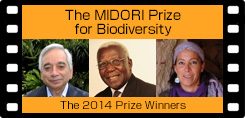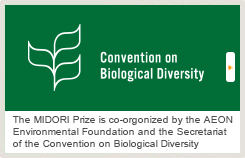The MIDORI Prize for Biodiversity 2010

- Gretchen C. Daily
- United States of America
Professor, Stanford University
Remarks
Mr. Takuya Okada, Chairman of the AEON Environmental Foundation; the MIDORI Prize Committee of Judges; the partners in the Prize – the Ministry of the Environment, Japan; the Secretariat of the Convention on Biological Diversity, and the United Nations University – and Distinguished Guests, Ladies and Gentlemen:
I wish to say how grateful I am to receive the MIDORI Prize for Biodiversity, and to share this honor with such tremendous leaders in conservation. I am happy to share it, as well, with my life mentors and collaborators.
I wish also to thank all of you for taking part in this event, and in the 10th Meeting of the Conference of the Parties to the Convention on Biological Diversity. The leadership of Japan is deeply inspiring – in hosting these critical meetings, and in fostering investments around the world in biodiversity conservation. I hope that political leaders in my own country, concerned with the fate of biodiversity and humanity, will also prevail in setting an example for the world.
And I thank you especially for your own personal role in the quest to harmonize people and Nature.
The image of "Midori" is beautiful – of trees and continuous planting of more trees, growing steadily and taking root to transform the way people and cultures think about Nature. Our collective planting efforts are attracting the broad societal participation needed to carry ideas through to action, to highlight the many values of Nature – and costs of losing them – and to incorporate these values into the policies and decision-making of governments, corporations, and individuals everywhere. The challenge now is to replicate and scale models of success, and to develop science and policy foundations that ensure their credibility and sustainability.
On with planting!
Profile
Dr. Daily (b. 1964) is a scholarly researcher in the Department of Biological Sciences at Stanford University. She has discovered the economic costs of environmental destructions, caused by human societies and their economic activities, and has contributed to the preservation of the ecosystem utilizing the concept of "ecosystem services." She is a leading expert in biodiversity and its sustainable use, and has provided a comprehensive picture of ecosystem services through her research, contributed to creating international frameworks, and formulated policy proposals on biodiversity protection for companies, and local and national governments.
Dr. Daily has been seeking to develop ecosystem service control through scientific approaches, and so far has published over 150 scholarly papers, which include "Ecosystem Services: Benefits Supplied to Human Societies by Natural Ecosystems" in 1997, and "The New Economy of Nature: The Quest to Make Conservation Profitable" in 2002.
Dr. Daily has made tremendous contributions in creating international research frameworks on the environment. She was a lead author for the "Millennium Ecosystem Assessment (MA)," an international framework, which aims at evaluating ecosystem services in order to preserve the ecosystem. In 1998, she contributed to an ecological forecasting and valuation effort for the US President's Committee of Scientific Advisors in Science and Technology and has taken a leading role in establishing ecosystem service concepts and quantitative assessment. She has also made noteworthy contributions in establishing international frameworks such as the "Intergovernmental Platform on Biodiversity and Ecosystem Services (IPBES)," the "International Programme on Biodiversity Science (DIVERSITAS)," the "SATOYAMA Initiative," and "The Economics of Ecosystems and Biodiversity (TEEB)," which prove that her research results and the ecosystem service concepts have worldwide influence.
In recent years, Dr. Daily has focused much of her energy on "the Natural Capital Project," a joint effort by Stanford University, the University of Minnesota, the World Wide Fund for Nature (WWF) and The Nature Conservancy. She co-founded this effort with the goal of integrating ecosystem services approaches into all major resource decisions that affect Earth's natural resources. The thrust of the Natural Capital Project is on three major advances that together will transform how businesses, governments, and individuals interact with nature: (1) developing new tools and approaches to value natural capital and incorporate those values into business practice and public policies; (2) demonstrating the power of NatCap tools in major resource decisions, in replicable and scalable models of success; and (3) engaging leaders in key institutions to magnify the impact of these successes. The ultimate objective is to improve the state of biodiversity and human well-being by motivating greater and more cost-effective investments in both.
This project is developing a software system to evaluate the economic value of ecosystems and forecast change under alternative decisions and scenarios. "InVEST" (for Integrated Valuation of Ecosystem Service and Tradeoffs) models and maps the delivery, distribution and economic value of ecosystem services. The tool will help visualize the impacts of potential decisions, identifying tradeoffs and compatibilities among environmental, economic and social benefits. Already, the "Natural Capital Project" has been applied worldwide and Dr. Daily especially has been playing a vital role in China, Costa Rica and Hawaii to conserve biodiversity through designing specific plans and directions.
Dr. Daily has enhanced recognition of the value of ecosystems and has successfully translated scientific knowledge into practical frameworks that can be used by business and in the political arena. Dr. Daily can be expected to continue such innovative work and promote awareness of the concept of ecosystem service in the international community.
Dr. Daily is expected to continue to convey the importance and relevance of environmental science for biological diversity not only to the academic arena but also to business, NGOs and civil society all over the world through various public speaking engagements and workshops in the future.
In summary, Dr. Daily has greatly contributed to the sustainable use of biodiversity, which is one of the aims of the Convention on Biological Diversity (CBD). Her achievements fit the requirements for the MIDORI Prize, that is, an individual who has made outstanding contributions and has had an impact on future activities for biodiversity conservation.
* This profile was prepared in 2010.
Biographical Summary
- 1986
- B.S. in Biological Sciences, Stanford University
- 1987
- M.S. in Biological Sciences, Stanford University
- 1992
- Ph.D. in Biological Sciences, Stanford University
- 1992〜1995
- Winslow/Heinz Postdoctoral Fellow, Energy and Resources Group, UC Berkeley
- 1995〜2002
- Bing Interdisciplinary Research Scientist, Dept. Biological Sciences, Stanford University
- 2002〜2005
- Fellow, Institute for International Studies, Stanford University
- 2005〜
- Bing Professor of Environmental Science, Department of Biological Sciences, Stanford University
Senior Fellow, Woods Institute for the Environment
Director, Center for Conservation Biology
Record of Awards
- 2003
- Fellow of the American Academy of Arts and Sciences (USA)
- 2005
- Fellow of the National Academy of Sciences (USA)
- 2008
- Fellow of the American Philosophical Society (USA)
The Sophie Prize (The Sophie Foundation, Norway) - 2009
- International Cosmos Prize (The Commemorative Foundation for the International Garden and Greenery Exposition, Japan)
Books and Articles
- 1997
- "Nature's Service: Societal Dependence on Natural Ecosystems," Island Press
- 2002
- "The New Economy of Nature: The Quest to Make Conservation Profitable," Island Press
- 2009
- "Ecosystem service in decision making: time to deliver" Frontiers in Ecology and the Environment, Vol7.No.1:21-28
- 2010
- "Boundaries for a Healthy Planet," Scientific American, April 2010 issue










